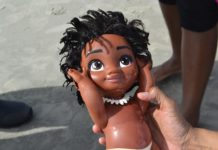While reading Lenore Skenazy’s book Free-Range Kids, I couldn’t help but think that while dubbing her “America’s Worst Mom” was an overstatement, I wouldn’t put a nine-year-old on the subway alone either. That’s what she did. She handed her son a subway card, a map, a few bucks change and bon voyage. I am too over-protective for that, maybe because having gone to college in New York City, I know how gross and scary the subway can be. I did, however, agree with her point that statistically speaking, America is no more dangerous than it was in the fifties or seventies when parents let their children run wild through the neighborhood.
So why has parenting culture become so restrictive and paranoid? Ms. Skenazy leans heavily on the media, emphasizing that the 24-hour news cycle commands a steady flow of fear-inducing stories, often featuring children. Since we all hear so much about the potential horrors of raising kids, we have internalized the sense of danger.
Part of it, I would venture, is a factor of age. Those old-school parents were younger (let’s say on average 25), and one thing I’ve noticed is that the age at which we parent makes a difference. While a National Geographic article on the teenage brain insisted teens evaluate risk the same way as adults, they parent differently. A viewing of Teen Mom will assure you of that. They practically let their kids chew on electrical cords while they consider doing their homework. On the other extreme, perhaps more conscious of their own impending mortality, older folks often run to intervene when I have given children space to stumble. The same people who didn’t use a car seat when they were raising kids in the sixties are running across the playground to make sure the kid I nanny doesn’t fall off the first step of the jungle gym, an accident I am familiar enough with to allow and even enjoy. There is no better physical comedy. As the average parent gets older, I hypothesize that their paranoia level rises in tandem. At the tender age of thirty, I am in the middle-of-the-age bell curve of parenting, but I’m trying to stay young at heart.
The most recent paranoia I’ve chosen to eschew concerns the eating of sand. My current charge is obsessed with the gritty feel of it on his gums and developing chompers. No visit to the park is complete without a mouthful. I know it’s a phase, and although I remind him sand is not food and brush what I can off his face and out of his mouth, it is not a battle I’ve chosen to fight. His parents–loving sweet, wonderful people–came to me concerned. The wife had read on a mothering website about the dangers of eating sand. Cats and other creatures (squirrels?) use the sandboxes as their potties and the poop will make the baby go blind. If that doesn’t work, the grains of sand can scratch his cornea. I nodded and gave the slim smile nannies quickly perfect and went home that night to research. How prevalent was the blindness-causing bacteria in cat poop? How many blind babies are we talking about?
Things to consider: cats are not a new thing and many of us grew up playing in sandboxes. Anyone remember them being filled with cat poop? Ever remember anyone going blind because of it? I’d love to see what the real risk would be, statistically, and compare it to something more dangerous like taking a bath.
There are inherent risks in parenting. It’s part of the game. It’s why when I started working with babies, I used to have anxiety dreams in which I’d lose them, leave them or they would turn into little black worms and scuttle under the couch. Don’t mind that glimpse into my psyche; my point is while it is important to judge safety, it is also important to prioritize carefully and not let your fears get in the way of your child’s exploration. If you impose too many limits for safety’s sake, you rob your children of the chance to develop good judgment, something they will need for when they really are free range, by which I mean an adult.
The number one priority is keeping them alive–I get that, it’s a biological imperative–but as our world grows and our sense of control over it (a delusion) grows with it, we have broadened our sense of what keeping children out of harm’s way entails. We no longer have to worry about marauding tigers so we’ve shifted our focus onto the toileting habits of housecats. That strikes me as overkill, especially when so many of the bigger dangers–second hand smoke, pollution, off-gassing furniture–are generally out of our control and taken for granted. Maybe we are simply looking for things to make ourselves feel better, like freaking out over germs and bacteria. If eating sand killed or blinded babies, babies would probably be less likely to pursue it. Sometimes we have to follow their lead, not in terms of sticking forks into sockets or playing in the street, but as far as eating dirt is concerned. A cynic could say life from birth is one long walk to the grave. So I say we might as well have a mouthful of sand for the journey.



































Umm, wow. While I am not by any means an over protective parent, this sort of post reminds me exactly of why I stay at home with my daughter instead of leaving her to the care of a stranger. Regardless of how you feel about the sand, you aren’t the child’s parent and don’t really get to decide whether it’s okay or not. As the care provider, it’s your responsibility to care for the child as closely to the parent’s desires as possible. If you want to make parenting choices, then become a parent.
I realize that sounds harsh, but there is a real, legitimate difference in how one cares for children who are their offspring and who are not. Becoming a parent, especially becoming a mother, changes you. You may think you would parent one way, or may think it’s okay to care for someone else’s kids in a certain way, but that could completely change once you’ve become a parent yourself. And, I can’t help but wonder: would you share this post with the mother of the baby you watch? Because if not, then you probably need to rethink your babysitting tune.
As for toxplasmosis, you can find some information here http://www.ncbi.nlm.nih.gov/pubmedhealth/PMH0001661/ and here http://www.cdc.gov/parasites/toxoplasmosis/. According to the CDC, about 22.5% of the population has been infected with it at some point. You may be right that it’s unlikely the child will get it from that particular sandbox, but it’s not a completely crazy concern, and I don’t think it’s the only possible worry from eating sand. We live on an island, and with both my daughter and the little boy I watched, I strongly discouraged it (to the degree of leaving the beach or picking them up out of the sand if it wasn’t stopping). Did I freak out? No. But, really, eating sand not a habit you want forming, and how hard is it to redirect?
…And really, saying “[i]f eating sand killed or blinded babies, babies would probably be less likely to pursue it” is just ridiculous. babies are not cognizant, rational beings. They do all sorts of things that could/would kill or seriously injure themselves.
Thank you for taking the time to respond to my column. It is clearly something you feel very passionately about. Leaving your child in another person’s care is, ultimately, a risk. No one is going to have the exact same decison making process and as a nanny I am entrusted by my employer’s to use good judgment, which is in and of itself subjective. If they had expressly told me to prevent “sand-eating” at all costs, I would, of course, have followed their policy. Instead the gave me the information and left it up to me to research and evaluate the risk. My determination that it wouldn’t likely kill him- afterall 22.5% of the population isn’t blind- was a use of my executive skills- which led me to redirect him a plenty but not remove him from the situation. I determined the value of his opportunity for learning and exploration at the park was greater than the risk in his ingesting a minute quantity of sand. Parents often times are paying me expressly to not freak out- to allow things that they can’t quite stomach because they know and trust that after having worked with babies for over a half a decade I know what’s worth freaking out over- maybe even better than they do- We clearly disagree on the example of “sand-eating,” and I respect your right as a parent to judge for yourself the risks in the world around you and raise your children as you see fit. I am glad that my charge managed to pass through his sand-eating phase with no physical injuries or illness incurred and has now moved onto the even less pleasant obsession of outlets and electrical cords. Now that’s something to worry over!
Great writing. I just read a few of your posts( I realize they are older posts), but still valid. It is amazing to see what freaks people out as parents. It sounds like you do a wonderful job with children. Good luck! I will be reading more.
I ate sand when I was little as a baby and nothing happened to me.